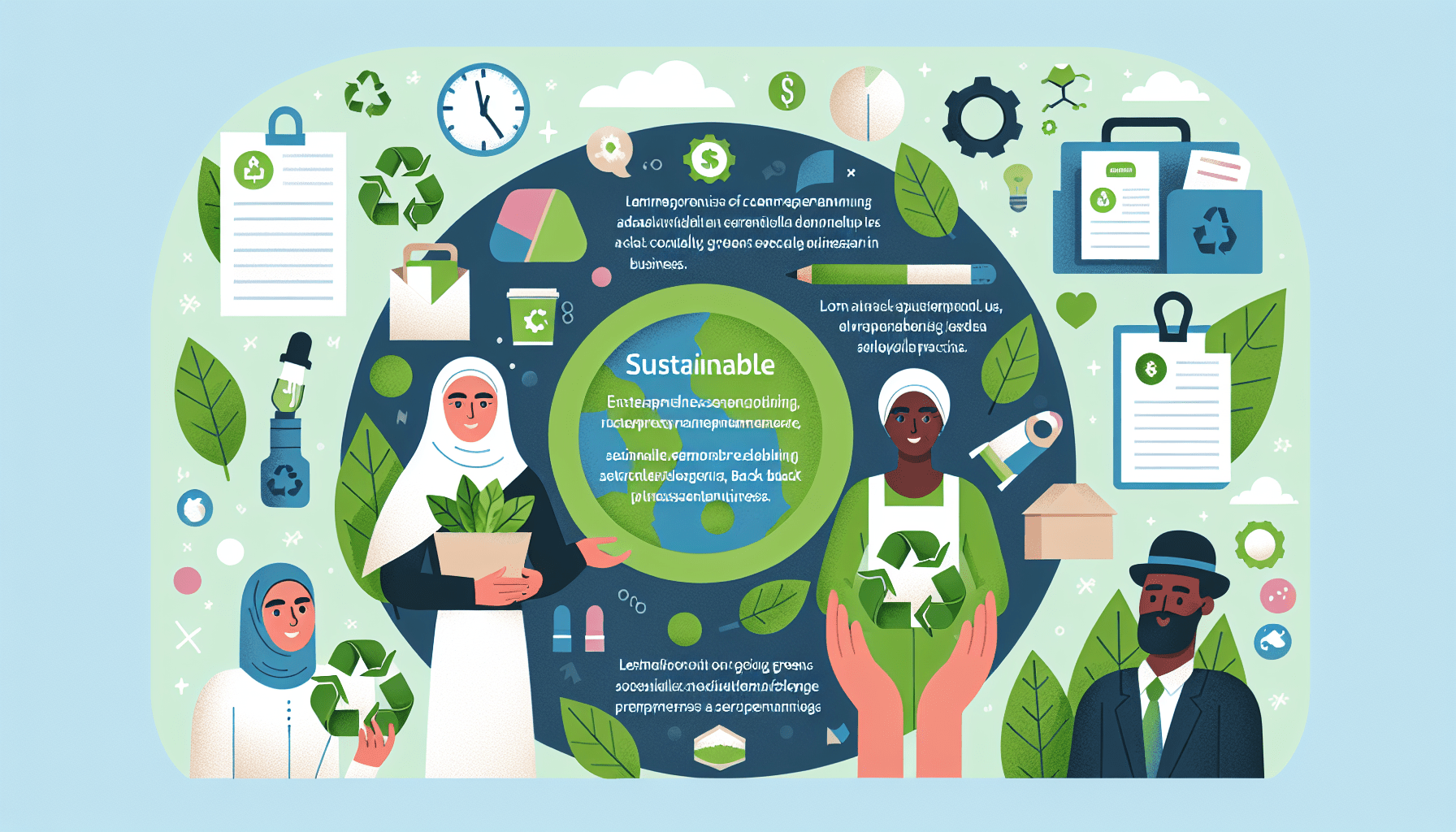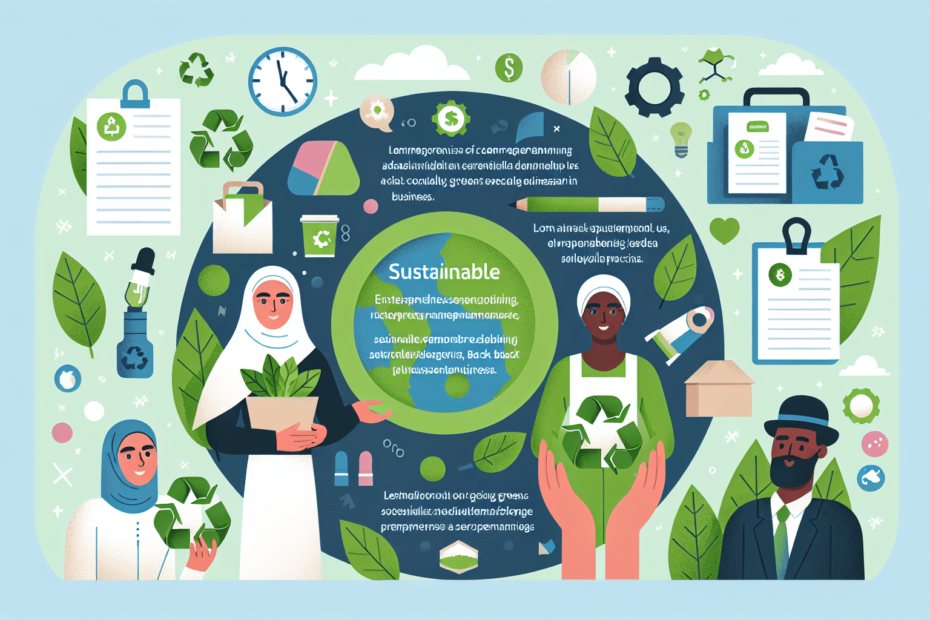Have you ever wondered how sustainability impacts modern entrepreneurship? In today’s rapidly evolving business landscape, sustainability has taken center stage, infiltrating every aspect of entrepreneurial ventures. From the products and services offered to the strategies and practices employed, entrepreneurs are increasingly recognizing the importance of integrating sustainable practices into their businesses. This article explores the multifaceted role sustainability plays in modern entrepreneurship, shedding light on its benefits, challenges, and how it can contribute to long-term success in a socially-conscious world.
Sustainability as a Competitive Advantage
In today’s highly competitive business landscape, sustainability has emerged as a powerful tool for gaining a competitive advantage. By adopting sustainable practices, businesses can achieve cost reduction and efficiency, which ultimately contributes to their bottom line. Through the efficient utilization of resources and the implementation of environmentally friendly processes, businesses can minimize waste and reduce their operational costs. This not only helps in improving profitability but also strengthens a company’s position in the market.
Furthermore, sustainability allows businesses to differentiate themselves from their competitors. With growing consumer awareness and preference for ethical and responsible businesses, companies that prioritize sustainability can position themselves as leaders in their industries. By transparently showcasing their commitment to sustainable practices, businesses can build trust and loyalty among customers. This market differentiation can lead to increased customer acquisition, retention, and ultimately, business growth.
Moreover, sustainability also plays a crucial role in enhancing a company’s reputation and brand value. Businesses that incorporate sustainable practices into their operations often enjoy a positive public perception, which contributes to the overall reputation of the company. This positive brand image not only attracts more customers but also attracts top talent to work for the organization. In today’s interconnected world, where information travels fast, a strong reputation can act as a shield during times of crisis and help businesses recover more effectively.
Sustainability as a Driver of Innovation
Sustainability acts as a powerful driver of innovation within organizations. By encouraging creativity and problem-solving, sustainability initiatives can spark innovative solutions to complex challenges. The pursuit of sustainable practices forces businesses to think outside the box and find new ways to operate more efficiently without compromising on environmental responsibility. This culture of innovation not only leads to improved processes but also opens up new avenues for growth and development.
Furthermore, sustainability drives technological advancements. To meet sustainability goals, businesses often need to invest in new technologies that are more energy-efficient, environmentally friendly, and socially responsible. These advancements not only benefit the business but also contribute to the larger societal goals of sustainability. For example, the adoption of renewable energy technologies not only reduces a company’s carbon footprint but also helps in the overall transition to a low-carbon economy.
Sustainability also fosters collaboration within and outside the organization. To achieve sustainability goals, businesses need to work closely with various stakeholders, including employees, suppliers, customers, and even competitors. This collaboration brings together diverse expertise and perspectives, leading to more effective solutions that address sustainability challenges holistically. By fostering collaboration, sustainability initiatives not only improve the overall sustainability performance of the business but also contribute to the larger sustainability agenda at a global level.

Sustainability as a Risk Mitigation Strategy
In an increasingly uncertain world, sustainability serves as a risk mitigation strategy for businesses. By minimizing their environmental impact, companies can reduce their exposure to environmental risks and disruptions. For example, by implementing sustainable waste management practices, businesses can minimize the risk of regulatory penalties and reputational damage associated with improper waste disposal. Additionally, by adopting sustainable supply chain practices, companies can reduce their vulnerability to disruptions caused by climate change events, resource scarcity, or supply chain disruptions.
Moreover, sustainability enables businesses to adapt to regulatory changes more effectively. As governments worldwide recognize the need for environmental protection, regulations and standards related to sustainability are becoming more stringent. By proactively embracing sustainable practices, businesses can stay ahead of regulatory requirements and avoid potential compliance issues. This proactive approach not only reduces legal risks but also positions the company as a responsible and trustworthy entity within the market.
Sustainability as a Catalyst for Employee Engagement
Sustainability initiatives can serve as a catalyst for employee engagement within organizations. By aligning employees’ values with the company’s sustainability goals, businesses can attract and retain top talent. In today’s competitive job market, employees are increasingly looking for workplaces that prioritize sustainability and social responsibility. By incorporating sustainability into the company’s mission and values, businesses can create a strong employer brand that appeals to prospective employees.
Moreover, sustainability efforts often contribute to increasing employee morale and productivity. When employees feel that their work is making a positive impact on the environment and society, they are more likely to be motivated and engaged. Sustainability initiatives also foster a sense of purpose and fulfillment among employees, leading to higher job satisfaction and lower turnover rates. Additionally, by involving employees in sustainability decision-making processes, businesses can tap into their creativity and perspective, leading to innovative and effective sustainability solutions.
Furthermore, sustainability initiatives help in promoting a positive company culture. When sustainability becomes ingrained in the organizational culture, it shapes the way employees interact with each other, the company, and the broader community. By fostering a culture of environmental stewardship and social responsibility, businesses can create a sense of shared purpose and unity among employees. This positive company culture not only benefits the employees but also enhances the overall reputation and brand value of the company.

Sustainability as a Customer Demand
Sustainability has become a significant factor in shaping consumer behavior and customer demand. With growing consumer awareness about environmental and social issues, customers are increasingly seeking out businesses that demonstrate ethical and responsible practices. When given a choice between two similar products or services, customers are more likely to choose the one that aligns with their sustainability values. Therefore, businesses that prioritize sustainability are often at an advantage in attracting and retaining customers.
Moreover, sustainability initiatives influence buying decisions across various industries. Whether it is the food industry, fashion industry, or technology sector, customers are increasingly demanding transparency and accountability in the products and services they consume. They expect businesses to adhere to ethical sourcing practices, reduce their carbon footprint, and promote fair labor conditions. By proactively addressing these sustainability concerns, companies can gain a competitive edge and win the trust and loyalty of their customers.
Furthermore, sustainability presents businesses with an opportunity to educate and engage customers. By communicating their sustainability initiatives and progress transparently, companies can build trust and establish long-term relationships with their customers. Customers appreciate businesses that are open and honest about their sustainability practices and are willing to support such businesses. Therefore, embracing sustainability as a customer demand can lead to increased customer loyalty, positive word-of-mouth marketing, and ultimately, business growth.
Sustainability as a Financial Benefit
Contrary to popular belief, sustainability can offer significant financial benefits to businesses in the long run. One such benefit is access to impact investment and funding. As sustainability becomes a mainstream concern, impact investors are increasingly looking for businesses that align with their environmental and social impact goals. By incorporating sustainability into their operations, businesses can attract impact investment and access funding sources that prioritize sustainability outcomes. This not only provides a financial boost but also opens up opportunities for strategic partnerships and collaborations.
Moreover, sustainability initiatives can lead to long-term cost savings for businesses. By optimizing resource utilization and reducing waste, companies can lower their operational costs and improve their overall efficiency. For example, implementing energy-efficient technologies or adopting sustainable supply chain practices can result in significant cost reductions over time. Additionally, by reducing waste generation and implementing effective waste management systems, businesses can avoid costly penalties associated with environmental violations.
Furthermore, sustainability can contribute to enhanced financial performance. Studies have shown that companies that prioritize sustainability outperform their competitors financially. By incorporating sustainability into their business strategy, companies can achieve better risk management, cost control, and revenue generation. Sustainability-driven innovations also open up new market opportunities and attract a diverse customer base, thereby positively impacting the financial performance of the business.

Sustainability as a Global Responsibility
Sustainability is not only important for individual businesses but also for the larger goal of global responsibility. It plays a crucial role in addressing climate change, preserving natural resources, and contributing to sustainable development goals. As businesses across the globe collectively embrace sustainability practices, the positive impact can be immense.
Addressing climate change is one of the most critical challenges of our time, and businesses have a significant role to play in mitigating its impacts. By reducing greenhouse gas emissions, promoting energy efficiency, and transitioning to renewable energy sources, businesses can contribute to the global efforts in combating climate change. This collective action can lead to a more sustainable and resilient future for all.
Preserving natural resources is another important aspect of sustainability. By adopting sustainable sourcing practices and promoting circular economy principles, businesses can minimize resource extraction and waste generation. This helps in preserving natural habitats, conserving biodiversity, and ensuring the long-term availability of essential resources. As businesses rely on the health and availability of natural resources, it is their responsibility to protect and preserve them for future generations.
Additionally, businesses can contribute to the achievement of sustainable development goals (SDGs) set by the United Nations. The SDGs provide a roadmap for global sustainability, covering a wide range of issues such as poverty eradication, gender equality, clean energy, and responsible consumption and production. By aligning their sustainability efforts with the SDGs, businesses can actively contribute to the global agenda of sustainable development and create a positive impact on society.
Sustainability as a Government Incentive
Governments around the world are recognizing the importance of sustainability and offering various incentives for businesses to embrace it. One such incentive is tax incentives and grants. Governments often provide tax breaks or financial incentives to businesses that adopt sustainable practices or invest in renewable energy technologies. These incentives not only reduce the financial burden on businesses but also encourage them to prioritize sustainability in their operations.
In addition to tax incentives, compliance with environmental regulations is another government incentive for businesses to embrace sustainability. Governments impose strict environmental regulations to protect the environment and ensure sustainable development. By complying with these regulations, businesses not only avoid penalties and legal consequences but also demonstrate their commitment to environmental responsibility. Compliance with environmental regulations enhances the reputation and credibility of businesses, thereby attracting more customers and stakeholders.
Moreover, governments provide businesses with access to public procurement opportunities. Public procurement is a significant market segment that presents businesses with a unique opportunity to showcase their sustainability efforts. Governments often require suppliers to meet specific sustainability criteria to participate in public procurement processes. By embracing sustainability, businesses can position themselves as preferred suppliers and gain a competitive advantage in securing government contracts. This opens up a new avenue for business growth and development.

Sustainability as a Collaborative Effort
Sustainability is a collaborative effort that requires businesses to work closely with various stakeholders. Partnerships with nonprofit organizations play a crucial role in this collaboration. Nonprofit organizations often have expertise and experience in sustainability issues and can provide valuable guidance and support to businesses. By partnering with nonprofits, businesses can tap into their knowledge and resources, leading to more effective sustainability initiatives.
Furthermore, engagement with government agencies is essential for businesses to navigate the regulatory landscape and access government incentives. Government agencies provide businesses with insights into the latest regulations and requirements, ensuring compliance and alignment with sustainability goals. By collaborating with government agencies, businesses can stay informed, influence policy discussions, and contribute to the development of sustainable business practices.
Additionally, collaboration with industry peers is critical in driving collective action towards sustainability. By sharing best practices, knowledge, and resources, businesses can collectively address sustainability challenges and make a more significant impact. Collaborative initiatives, such as industry-wide sustainability standards and certifications, not only help businesses improve their sustainability performance but also build trust and credibility among stakeholders. Together, businesses can drive transformative change and shape a more sustainable future.
Sustainability as a Long-term Business Strategy
Sustainability should be viewed as a long-term business strategy rather than a short-term trend. By building resilience and future-proofing their operations, businesses can better adapt to changing market trends and emerging risks. Sustainability acts as an insurance policy against future uncertainties and ensures the long-term viability of the business.
Building resilience involves identifying and mitigating risks associated with climate change, resource scarcity, and changing consumer preferences. By incorporating sustainability into the core business strategy, businesses can proactively address these risks and turn them into opportunities for growth. For example, businesses that rely heavily on fossil fuels can invest in renewable energy sources to reduce their dependence on volatile energy markets and mitigate climate-related risks.
Furthermore, sustainability enables businesses to anticipate changing market trends and stay ahead of the competition. As sustainability becomes increasingly important to customers, businesses that proactively embrace sustainable practices can identify emerging market trends and consumer preferences. This early recognition allows businesses to adapt their products, services, and marketing strategies to meet customer demands effectively. By anticipating changing market trends, businesses can maintain a competitive edge and secure their market share in the long run.
Moreover, sustainability allows businesses to create a legacy that goes beyond profits. By incorporating sustainable practices into their operations, businesses can contribute to a more sustainable and equitable world. This legacy transcends the business itself and has a positive impact on future generations. This long-term perspective not only attracts employees, customers, and investors but also ensures the continued success and relevance of the business in the ever-changing global landscape.
In conclusion, the role of sustainability in modern entrepreneurship cannot be understated. Sustainability offers numerous benefits to businesses, ranging from cost reduction and efficiency to market differentiation and enhanced reputation. It acts as a catalyst for innovation, driving creativity, problem-solving, and technological advancements. Sustainability mitigates risks, enables adaptation to regulatory changes, and fosters employee engagement. Businesses need to recognize the growing customer demand for sustainability and tap into the financial benefits it offers. Moreover, sustainability is not only a business responsibility but also a global responsibility that addresses climate change, preserves natural resources, and contributes to sustainable development goals. Governments provide incentives for businesses to embrace sustainability, and collaboration with nonprofit organizations, government agencies, and industry peers is crucial. Sustainability should be viewed as a long-term business strategy, building resilience, anticipating market trends, and creating a lasting legacy. In this era of increased awareness and accountability, sustainability is not just a choice but a necessity for businesses to thrive and make a positive impact on the world.
